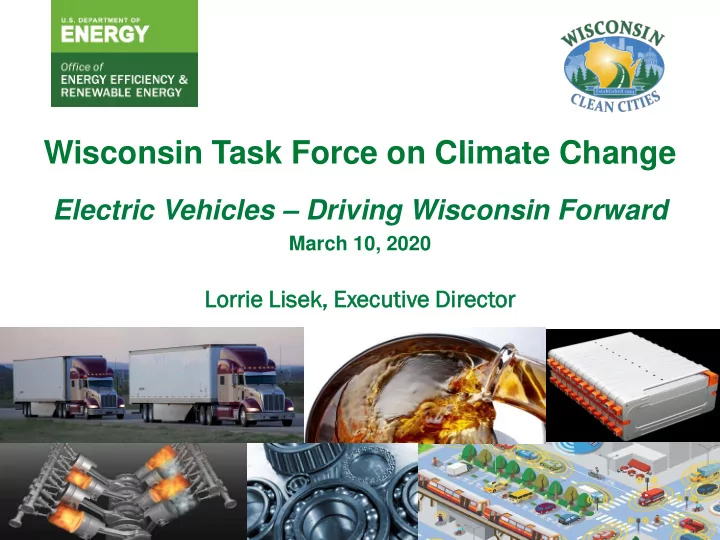

Wisconsin Task Force on Climate Change Electric Vehicles – Driving Wisconsin Forward March 10, 2020 Lorri rrie L Lisek, E , Executive D Dire rector or
Department of Energy – Transportation Focus Economic Growth National Security Affordability for Businesses Reliability/Resiliency and Consumers U.S. DEPARTMENT OF ENERGY OFFICE OF ENERGY EFFICIENCY & RENEWABLE ENERGY 2
WI Clean Cities: Local Partnerships – Global Impact • Statewide organization • Public/Private Partnerships • Nearly 36M GGE Petroleum Displaced in 2018 • 2018 Reduction in GHG Emissions 122,000 tons Since 2011, WCC has assisted in Multi Unit Dwelling EV Data Grant Program securing over $21M in funding for NGV UP TIME – Natural transportation projects. Gas Project U.S. DEPARTMENT OF ENERGY OFFICE OF ENERGY EFFICIENCY & RENEWABLE ENERGY 3
ELECTRIC VEHICLES U.S. DEPARTMENT OF ENERGY OFFICE OF ENERGY EFFICIENCY & RENEWABLE ENERGY 4
WHAT ARE PLUG-IN ELECTRIC VEHICLES? Plug-in Hybrid Electric Vehicle (PHEV) Plug-in Hybrid or Extended Range Electric Vehicle Electric Vehicle (EREV): Vehicle that can be powered by either batteries, and/or a gasoline engine. Battery Electric Vehicle Battery Electric Vehicle (BEV): All-electric car only powered by batteries. U.S. DEPARTMENT OF ENERGY OFFICE OF ENERGY EFFICIENCY & RENEWABLE ENERGY 5
Plug-In Electric Vehicles Sales in the United States • Top 10 selling models account for more than 80% of overall sales • Nearly 30 models are actively selling in the Midwest market • Wisconsin has nearly 10,000 * Updated August, 2019 registered BEV’s Sales of all-electric vehicles increased by about 3,000 more sold and PHEV’s. in 2019 as compared to 2018. Total plug-in vehicle sales were nearly 326,000 or 2% of the nearly 17M vehicles sold in 2019. U.S. DEPARTMENT OF ENERGY OFFICE OF ENERGY EFFICIENCY & RENEWABLE ENERGY 6
WHAT VEHICLES ARE AVAILABLE IN THE MIDWEST? U.S. DEPARTMENT OF ENERGY OFFICE OF ENERGY EFFICIENCY & RENEWABLE ENERGY 7
WHERE ARE THE CHARGING STATIONS? #1 QUESTION AT THE MILWAUKEE AUTO SHOW FACT: ACCORDING TO US DEPT. OF ENERGY OVER 80% OF CHARGING HAPPENS AT HOME *As of February 2020 U.S. Department of Energy AFDC Station locator U.S. DEPARTMENT OF ENERGY OFFICE OF ENERGY EFFICIENCY & RENEWABLE ENERGY 8
MICHIGAN TO MONTANA (M2M) I-94 CORRIDOR PROJECT M2M I94 corridor covers 1500 miles From Billings, Montana to Port Huron, Michigan Deployment: 60 trucks, and 15 alternative fueling stations Planning: Sustainable alternative fuel corridor model Provide outreach, training, and community based partnerships. U.S. DEPARTMENT OF ENERGY OFFICE OF ENERGY EFFICIENCY & RENEWABLE ENERGY 9
Michigan to Montana I-94 Corridor Project (M2M) M2M Current EV Project Status (On-going) 3 EV Deployments: 1) Tomah, WI 2) Moorehead, MN 3)Hudson, WI – Grand Opening April, 2020 Tomah Grand Opening 3 Under Construction EV Deployments: Fergus Falls, MN, Alexandria, MN, St. Cloud, MN 8 Identified Sites: 4 North Dakota, 4 Montana Wisconsin EV Gap – Wisconsin Dells U.S. DEPARTMENT OF ENERGY OFFICE OF ENERGY EFFICIENCY & RENEWABLE ENERGY 10
WHY HY E ELE LECT CTRIC V VEHI HICLES IN WISCON SCONSIN? U.S. DEPARTMENT OF ENERGY OFFICE OF ENERGY EFFICIENCY & RENEWABLE ENERGY 11
Emissions from Hybrid and Plug-In Electric Vehicles • HEVs, PHEVs, and EVs typically produce lower tailpipe emissions than conventional vehicles • The source of electricity has a direct impact on emissions • In geographic areas using relatively low- polluting energy sources for electric generation the well-to wheel emission benefit is typically greater Source: US Department of Energy AFDC website U.S. DEPARTMENT OF ENERGY OFFICE OF ENERGY EFFICIENCY & RENEWABLE ENERGY 12
U.S. DEPARTMENT OF ENERGY OFFICE OF ENERGY EFFICIENCY & RENEWABLE ENERGY 13
Elect ectric V c Vehi ehicles es and Hea nd Health Benef enefits: EV’s produce no tailpipe emissions-charging the battery may increase pollution at • the power plant, total emissions associated with driving EV’s are typically less than gasoline cars, particularly when generated by renewable sources. Greenhouse gas emissions from transportation sources surpassed those of power • plants in December, 2017. According to U.S. Energy Information Administration, 17% of U.S. power is generated by renewables sources. Coal generation is down by 1/3 from 2006. The World Health Organization linked increased respiratory diseases such as • asthma, lung cancer, and cardiac episodes to air pollution. Research shows: • Living long term in a city with elevated air pollution affects lungs equal to smoking a pack of cigarettes a – day for 30 years. Counties with poor air quality have high rates of bipolar disorder and depression. – Exposure to high levels of nitrogen dioxide and carbon monoxide are associated to higher risk of age – related macular degeneration. V.S. U.S. DEPARTMENT OF ENERGY OFFICE OF ENERGY EFFICIENCY & RENEWABLE ENERGY 14
Elect ectric V c Vehi ehicle e Barr rrier ers • Range confidence • Lack of charging in multi unit dwellings • Cost • Availability of vehicles • Dealer education • Lack of incentives • Fuel/Road Tax issues U.S. DEPARTMENT OF ENERGY OFFICE OF ENERGY EFFICIENCY & RENEWABLE ENERGY 15
Cl Clea ean n Ci Cities es T Tools www.afdc.energy.gov https://evolution.es.anl.gov U.S. DEPARTMENT OF ENERGY OFFICE OF ENERGY EFFICIENCY & RENEWABLE ENERGY 16
Wisc sconsi sin C Clean ean C Cities “D “Driving Wisconsin F n Forward”
Thank You! Lorrie Lisek Executive Director 231 W. Michigan, P321, Milwaukee, WI 53203 (414)221-4958 Lorrie.lisek@wicleancities.org U.S. DEPARTMENT OF ENERGY OFFICE OF ENERGY EFFICIENCY & RENEWABLE ENERGY 18
Recommend
More recommend